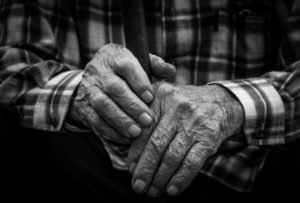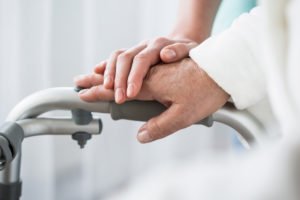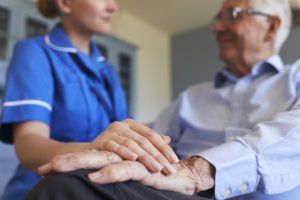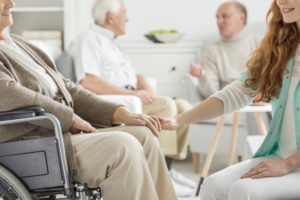
Good nutrition is critically important for our overall health and well-being, as is making sure we get enough fluids to keep our bodies hydrated. Maintaining proper nourishment and preventing dehydration can be especially challenging for the elderly, and malnourishment and dehydration can be particularly harmful in older adults.
Every year, millions of older Americans live in nursing homes. When you put your parent, spouse, or loved one in a nursing home, you expect them to be treated with the highest degree of care. However, nursing home abuse may be more common than you think, and dehydration and malnourishment in nursing homes may be signs of more serious problems with your loved one’s care.
Signs and Symptoms of Dehydration and Malnourishment
According to the Mayo Clinic, normal, age-related changes, such as a decrease in the senses of taste and smell, may make it more difficult for seniors to maintain good nutrition. Likewise, as we age, our bodies naturally retain less fluid and we may not realize that we are thirsty, increasing the risk of dehydration.
Many older adults suffer from dysphagia, or difficulty swallowing, which may make it more difficult to consume enough food and drink, as does discomfort from dentures or other dental issues. Limited mobility may prevent some seniors from helping themselves to food and water.
Infections, cancer, diabetes, dementia, and similar preexisting conditions may contribute to increased chances of malnourishment and dehydration. Medications prescribed to treat these and other health issues can cause a decrease in appetite and a higher likelihood of becoming dehydrated.
Malnourishment in nursing home residents can lead to a host of health problems, including muscle weakness, decreased bone mass, weight loss, a weakened immune system, poor wound healing, and an increased risk of hospitalization and death. Signs that your loved may be malnourished include:
- Weakness
- Chronic fatigue
- Poor concentration
- Feeling cold all of the time
- Frequent illnesses and slow recovery
The chances for dehydration and malnourishment grow if seniors throw up or have diarrhea. Even something like the flu can impact a senior’s health and contribute to dehydration or poor nourishment.
Severe dehydration can cause serious health issues with the kidneys and other parts of the urinary system. Dehydration can cause death if the senior’s blood pressure is too low and does not have enough oxygen.
Symptoms of dehydration include:
- Urine that is dark in color
- Infrequent urination
- Exhaustion and dizziness
- Dryness in the mouth or of the tongue
- Cheeks or eyes that look hollow and sunken in
In some mild cases, a senior may just need to drink more water or eat more to reduce symptoms and dangers of dehydration or malnourishment. However, more serious cases may require more attention and intravenous fluids or nutrients.
If you believe your loved one is suffering from either of these conditions, you should speak with their doctor. A physician can make medication changes, prescribe vitamins and supplements, make dietary adjustments, and assess and treat underlying health conditions that can contribute to dehydration and malnourishment.
You should be aware that dehydration and malnourishment in nursing homes can be warning signs of nursing home abuse. You may wish to enlist the help of an attorney with experience in nursing home abuse to investigate the reasons behind your loved one’s condition. You should also know that abuse and neglect in nursing homes might constitute civil rights violations. Residents have the right to be free from abuse, neglect, exploitation, excessive use of physical restraint, overmedication, or seclusion. In other words, if you intend to take serious legal action against a nursing home’s administration, staff, or parent company, you might benefit from the expertise of civil rights attorneys.
For a free legal consultation, call (800) 712-9119
Nursing Home Abuse
A significant percentage of those living in a nursing home have dealt with neglect or have seen others suffer from this neglect, according to a survey reported by the National Center on Elder Abuse (NCEA). The same study also reported on the abuse experienced by residents.
Abuse can take many forms. Neglect is a form of abuse in which a resident’s needs are intentionally or unintentionally not met. When a resident is neglected, they do not have needed access to necessities such as food, water, and medical care. The Centers for Disease Control and Prevention (CDC) also reposts other forms of abuse that go beyond physical. Sexual abuse, emotional (or psychological) abuse, and financial abuse can happen in addition to physical abuse.
Dehydration and malnourishment in your loved one could mean they are not being given enough to eat and drink, or they are not being provided needed assistance at mealtimes. These are warning signs that more serious abuse could be taking place.
The weakness associated with malnourishment or dehydration can even lead to injuries like falls, especially if staff are not giving your loved one all the attention they need.
What to Do if You Suspect Abuse
If your loved one is dehydrated or malnourished, this could be a sign of neglect or abuse in the nursing facility. Neglect and mistreatment are illegal, and your loved one has rights. You can make a report to the nursing home and to the police. Try to include as many details as possible, as this may be able to help your case if you seek civil action.
Ben Crump Law, PLLC
Ben Crump Law, PLLC may be able to help you seek justice for your loved one. Dehydration and malnourishment are serious concerns for elderly individuals, and your loved one should not have to deal with abuse from caretakers. For more information about how an attorney can help, contact our team at (800) 712-9119.
Call or text (800) 712-9119 or complete a Free Case Evaluation form








